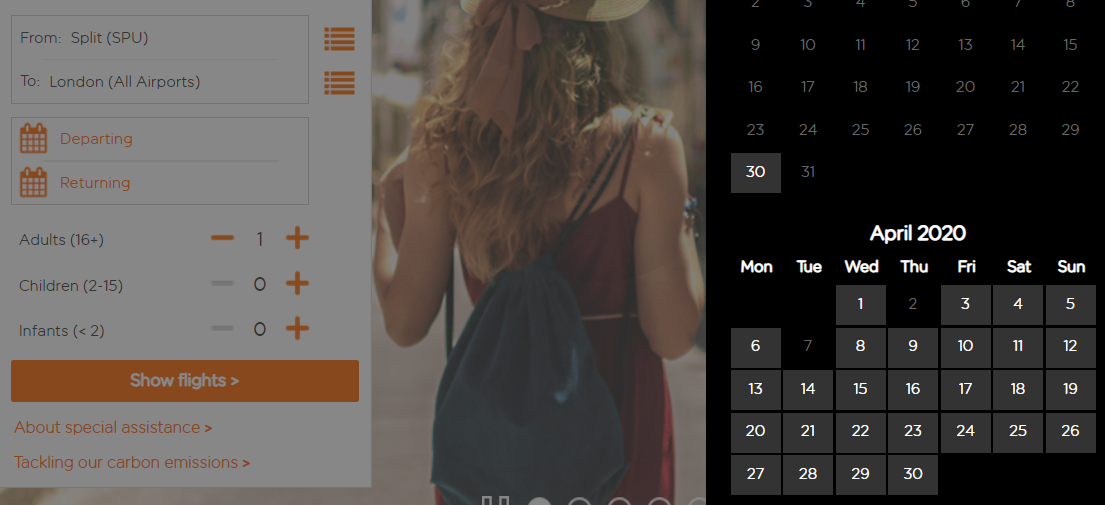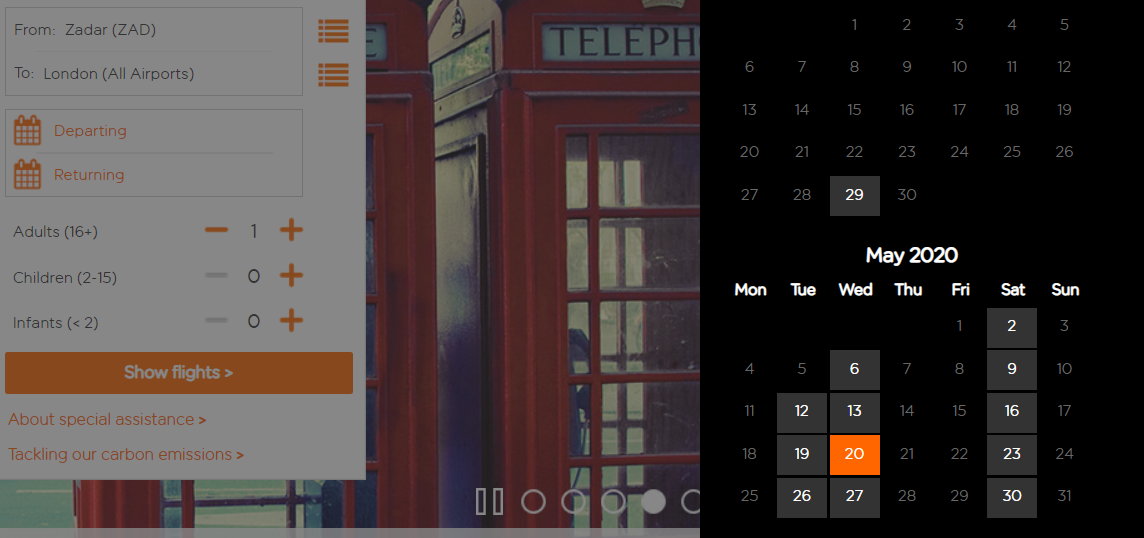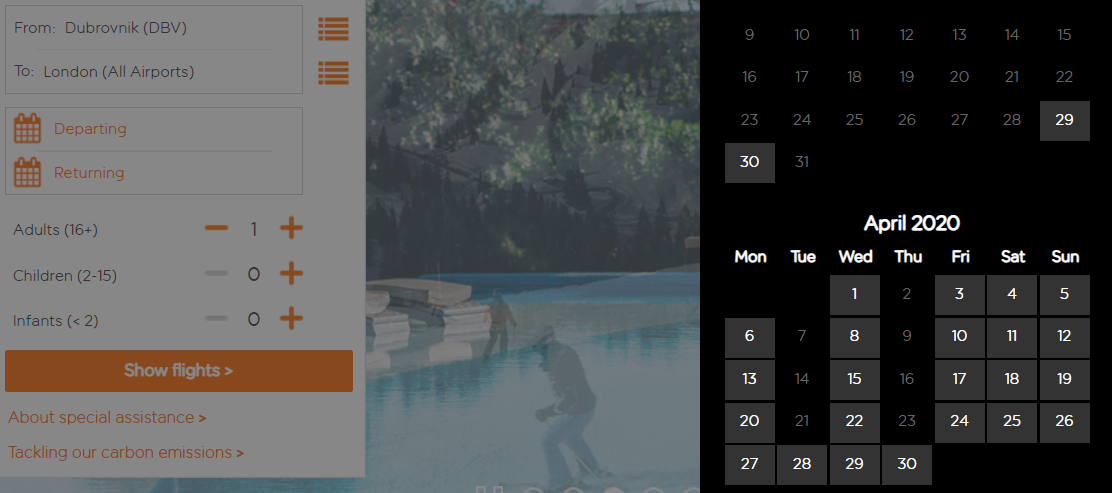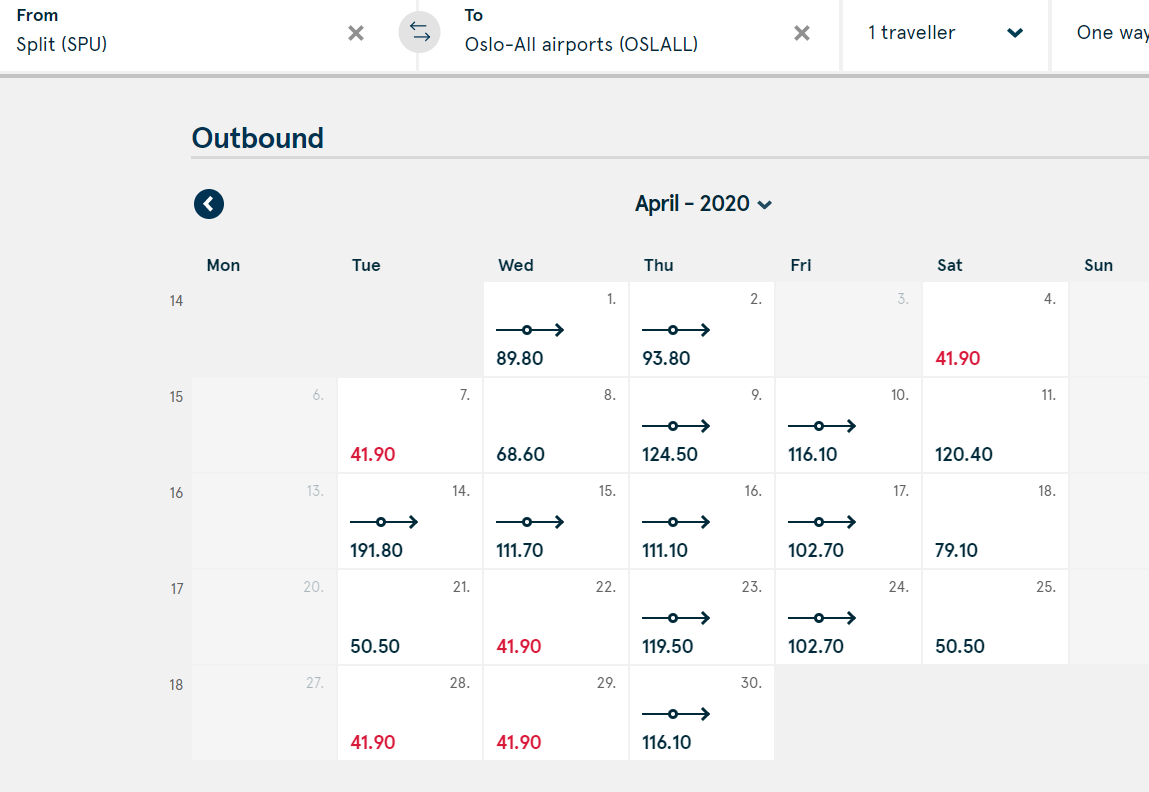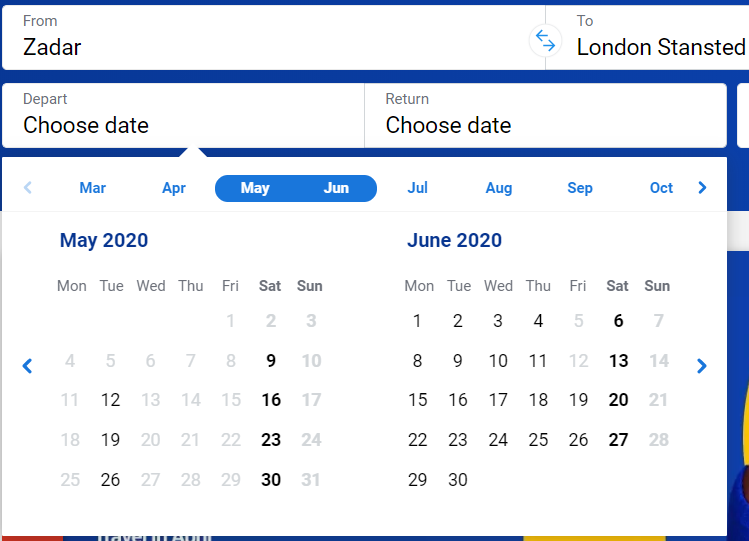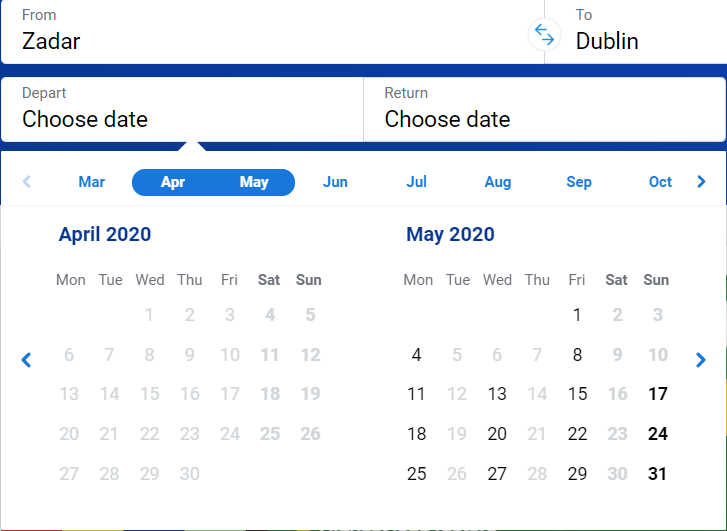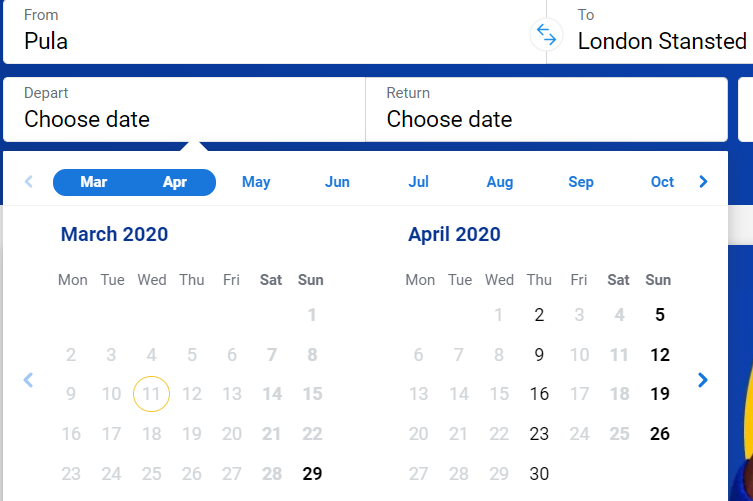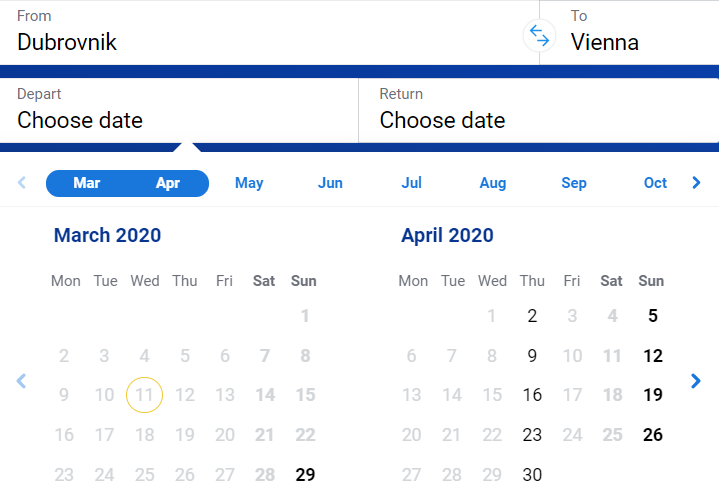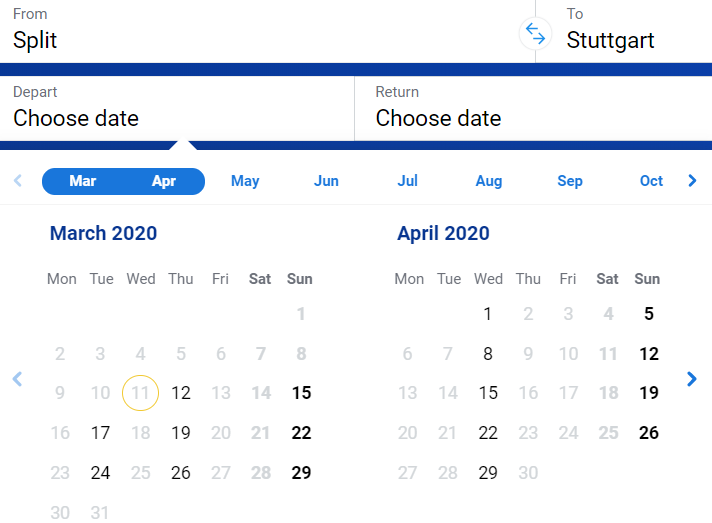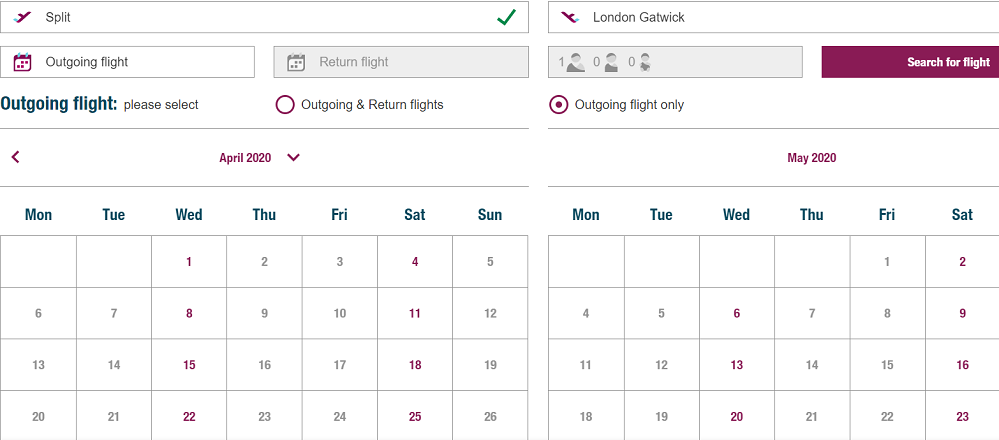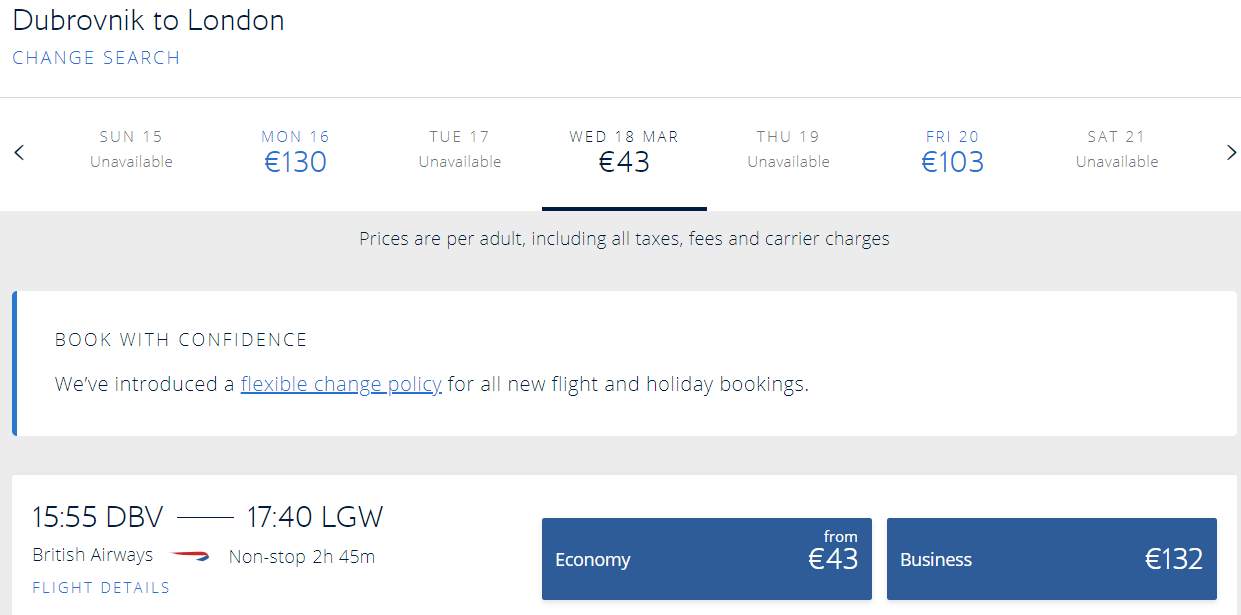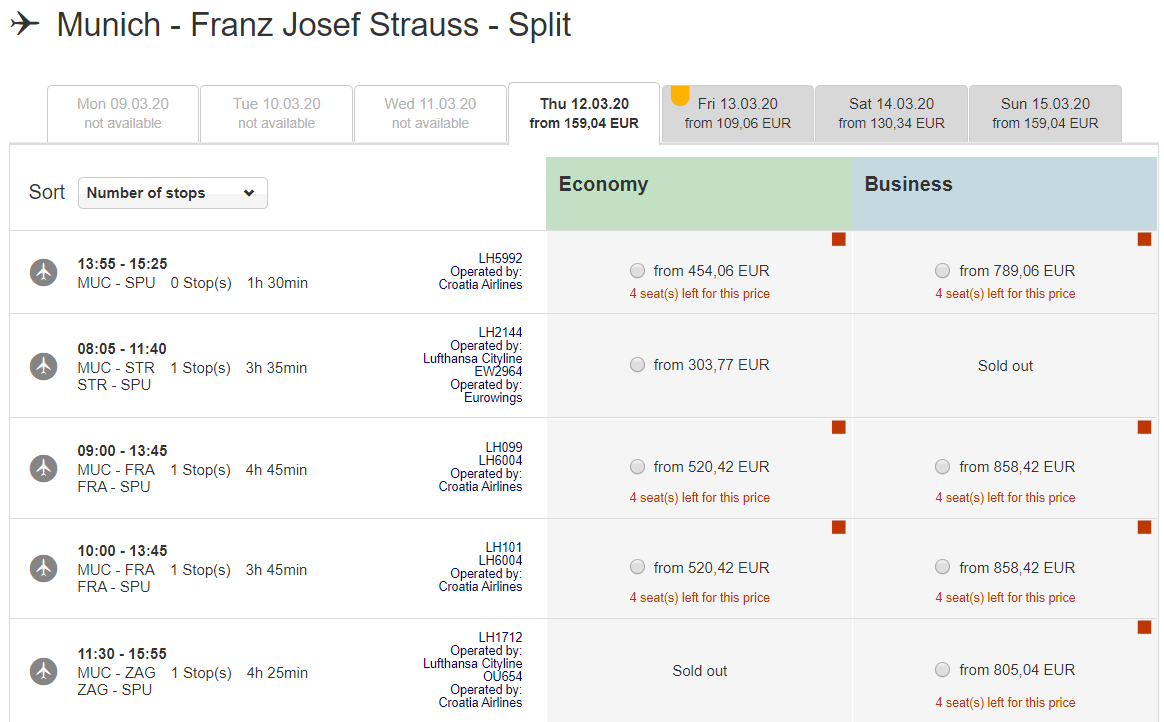Coronavirus Flight Cancellation Status for Croatia: easyJet, Norwegian, Ryanair, Eurowings, British Airways & More
Update - For the latest on the coronavirus in Croatia, follow the dedicated TCN section.
March 11, 2020 - Search terms such as United Airlines coronavirus flight cancellation are topping the Google search charts, but how are things with flights to Croatia, especially with a new flight frontier lockdown in neighbouring Italy?
These are uncertain times, and with the lockdown of Italy and all the cancelled flights due to the COVID-19 virus, tourists are understandably nervous.
There have - thankfully - been no fatalities in Croatia or its neighbouring countries yet, and the total number of case is 19. You can see the current corona map of Croatia at the bottom of this article.
Some flights have been cancelled, and some airlines have been more forthcoming than others with information. There is still some confusion about the situation in Croatia, and while we certainly do not have all the information at all, we are trying to build a picture of how things are looking.
What is certain is that there has been a significant number of flight cancellation measures taken for March and April, particularly it seems in Zadar. Many routes are now currently scheduled to start in May.
Below is an overview of the situation I have tried to put together. ANY additional info/links/resources will be gladly received in the public interest of building a broader picture. Please contact me with info on This email address is being protected from spambots. You need JavaScript enabled to view it.
Here is what I have found so far.
easyJet
I checked the easyJet site for flights to London. All looks ok at the moment from Split, with first bookable flight from March 31, 2020.
As with many other airlines, easyJet from Zadar to London is currently scheduled to start in May.
Services from London to Dubrovnik start on March 31.
For the latest travel information and details on flight cancellations policy, check the easyJet website.
Norwegian Air
Norwegian is one of the most important budget carriers to Croatia, and it helped open up the Scandinavian market. On its website, the Norwegian airline has stated that it plans to cancel 3,000 flights globally from mid-March to mid-June. You can follow the latest updates from their official website on this page.
The first scheduled available flight for the popular Oslo to Split route is on March 31, with April currently looking very available.
Ryanair
Ryanair has cancelled a lot of flights, with April to Zadar wiped out for some routes, according to some reader emails. London is currently on from May 9, but there are already come cancelled flights in June.
A similar situation to Dublin.
Pula, on the other hand, will start as things stand on March 29.
As will Ryanair in Dubrovnik, with its flight to Vienna.
And Ryanair is certainly not cancelling everything in March - Stuttgart to Split is already in operation, with the next flight tomorrow.
For the latest information on your Ryanair flight, you can check this page on their website.
Eurowings
Eurowings has introduced a flexible rebooking option for anyone flying before December 31, 2020. You can find out more on the following link.
Split to London Gatwick with Eurowings is currently available from April.
British Airways
British Airways has a dedicated COVID-19 FAQ page.
British Airways has announced global cancellations, but Dubrovnik from Gatwick is currently operational.
As is Split to London.
Croatia Airlines
Not so much information from Croatia Airlines on their website, but flights to Frankfurt from Zagreb, for example, seem to be proceeding as normal.
For more information, here is their travel information page.
Lufthansa
Lufthansa is an important connecting partner for Croatia, and the recent news that it plans to cut its flights by up to 50% will have a huge effect globally. Today, the German carrier announced 23,000 flight cancellations. You can keep track of their latest COVID-19 advice here.
This will no doubt have an effect on Croatian flights - for now, things seem to be relatively normal - Split to Munich availability above.
Qatar Airways
Qatar Airways is one of the most important intercontinental connections for Croatia, with 12 flights a week to Zagreb. More information about their COVID-19 and flight cancellation policy here.
Emirates
Emirates is also an important connection for Croatia, with six flights a week from Zagreb to Dubai and the world. Follow the latest on the dedicated COVID-19 travel page.
Turkish Airlines
Turkish Airlines is an extremely important regional and intercontinental partner - follow the latest updates on their dedicated page.
Korean Air
Tourism to Croatia from Korea has boomed in recent years, so much so that Korean Air even introduced daily flights. Sadly, this became the first airline with direct flights to Croatia to be affected. As TCN reported recently, the route has been discontinued until at least April 23. Click here for the latest information.
The other place to check for latest information are the airport websites.
For the latest on the coronavirus in Croatia, follow the dedicated TCN section.
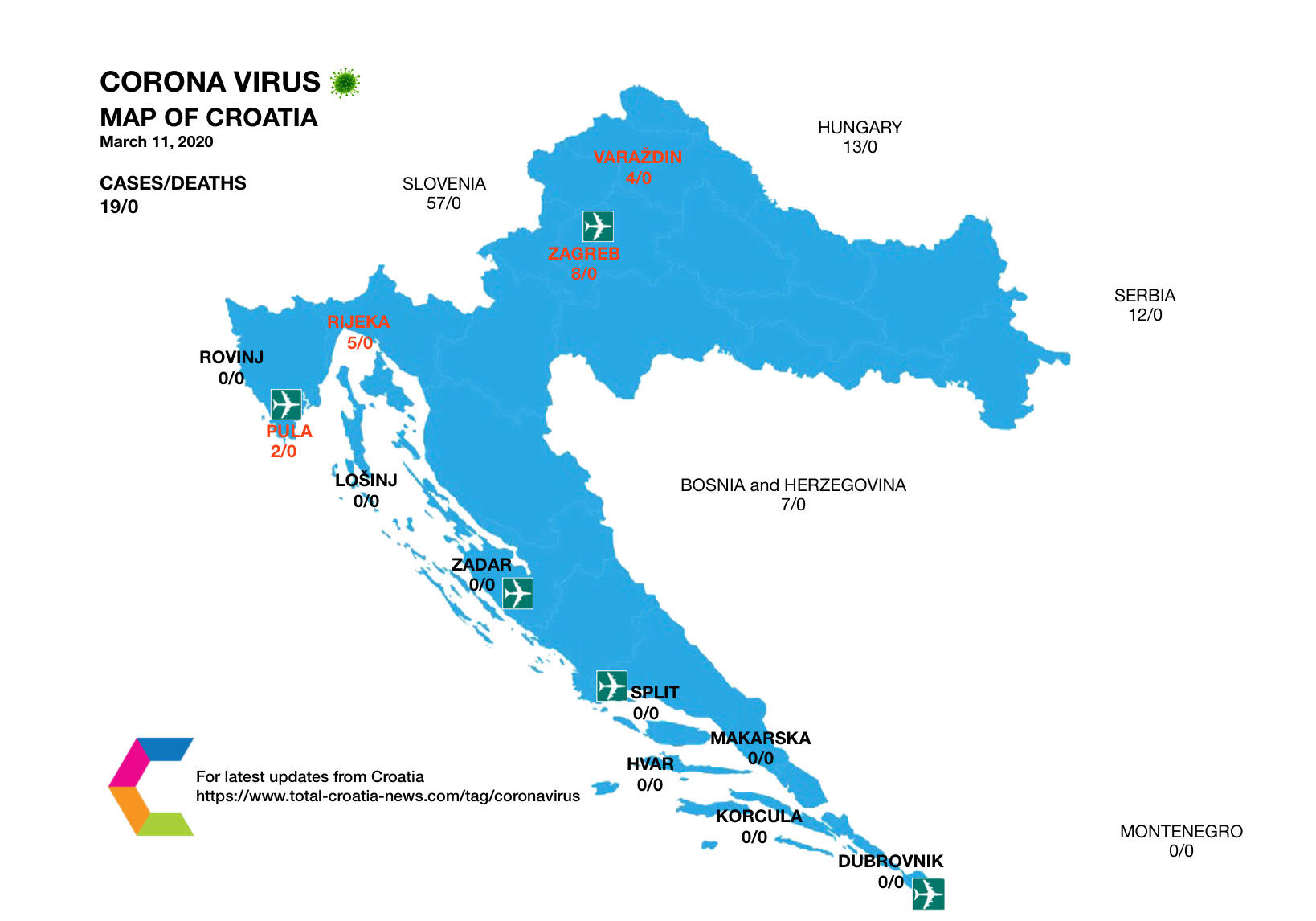
Croatian Tourism Ministry Temporarily Halting All Marketing Actions Due to Coronavirus
March 11, 2020 - The Croatian Tourism Ministry is currently stopping all marketing actions due to the coronavirus outbreak.
Dnevno.hr reports that Tourism Minister Gari Cappelli said on Wednesday that all marketing actions in tourism are coming to a halt due to the coronavirus outbreak and that actions with a special marketing approach are being prepared for all markets when they reopen.
Furthermore, the joint action of the Croatian Ministry of Tourism and the Croatian National Tourist Board, titled "A week off is worth it", has been canceled, which was announced from 10 to 19 April. This is an action that enables all Croatian citizens to visit and get to know other parts of our country by offering half the price of all tourist products, from accommodation, transportation, sights, to catering services and different experiences.
Meetings with all tourism stakeholders will now follow, after which, in Cappelli's view, measures will be known to alleviate the coronavirus situation.
Croatia Airlines also announced that they're launching a new flexible policy for international flights until May 31, 2020.
"Following the Coronavirus (COVID-19) outbreak, Croatia Airlines introduced a more flexible travel policy for all international passengers. The policy refers to existing and newly booked tickets up to March 31st 2020.
- passengers are entitled to date change without rebooking fee
- travel must be completed no later than December 31st 2020
- if, the original booking class is not available on the new flight, the fare difference will be charged.
Croatia Airlines continues to monitor the situation and recommendations of the competent institutions and authorities in Croatia and abroad.
Operations on the route Zagreb – Rome – Zagreb temporarily ceased
Croatia Airlines has suspended operations on the route Zagreb – Rome – Zagreb up until March 28th 2020.
- change without rebooking fee
- full refund
Croatia Coronavirus COVID-19 Health & Travel Update: March 11, 2020
For the latest March 20 update click here.
March 11, 2020 - There are 19 confirmed cases of the coronavirus (COVID-19) in Croatia, 3 of whom are in serious condition. Foreign nationals entering Croatia from infection hotspots (China, Italy, Iran, South Korea) will be subject to a 14-day quarantine, while a 14-day self-isolation is required for Croatian citizens.
Yesterday, the Civil Protection Staff of Croatia recommended cancelling all events for over 1,000 people. Several upcoming events have been cancelled. Updates to follow.
More than 4,585 people are dead from the virus, which originated in Wuhan City, China; and over 124,968 cases have been confirmed globally. There are 44,178 cases outside of mainland China and 12,462 in Italy.
*Follow this page for updates on the coronavirus in Croatia from Total Croatia News. Contact numbers for epidemiologists, travel advisories and measures for preventing the spread of the coronavirus can be found here.
Nineteen Coronavirus Cases in Croatia
As of March 11, 2020; nineteen coronavirus (COVID-19) patients have been reported in Croatia: 5 in Rijeka, 8 in Zagreb, 4 in Varaždin and 2 in Pula.
- The first patient from Zagreb became infected during his stay in Italy. The two other patients are close contacts. The third patient recently returned from a ski trip in Austria. The fourth patient is a hairdresser and recently came back from a conference in Munich. Three new cases were confirmed Wednesday evening. The latest patients returned from trips to Austria and Germany.
- A patient from Rijeka became infected during his stay in Italy. The four other patients are close contacts.
- The first patient from Varaždin spent time in Italy. The second case is a truck driver who had been in Italy and was in preventative self-isolation. The third and fourth cases are close contacts of the driver.
- Both patients in Pula had recently returned from Italy.
UPDATED: March 11, 2020 20:00 CET (Central European Time)
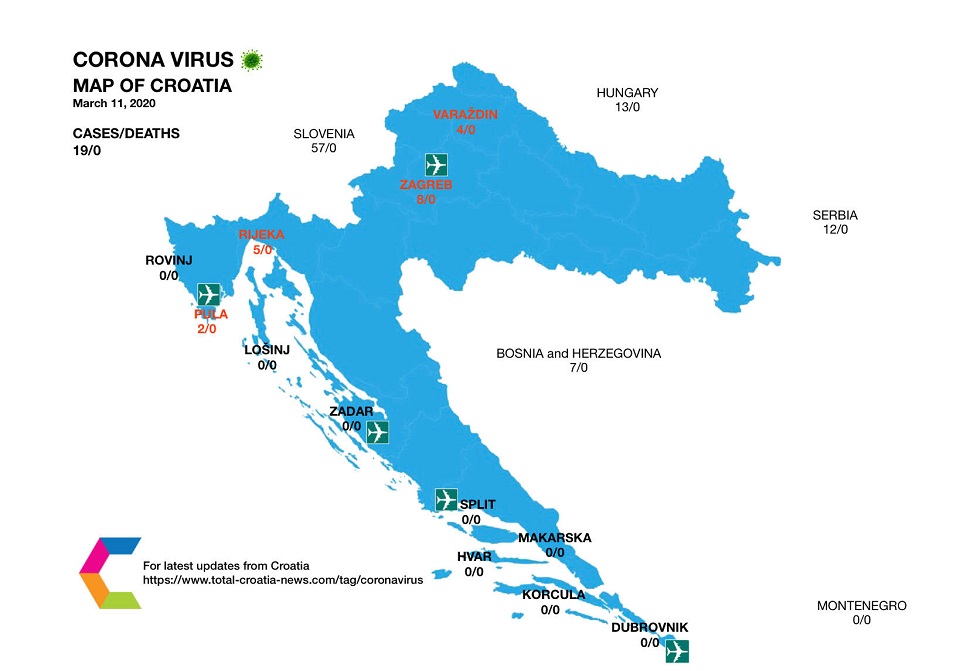
Croatia National Civil Protection Headquarters Update
Prime Minister Plenkovic convened an emergency meeting with the ministers and members of the Civil Protection Staff of Croatia today at 16:00 CET regarding further measures and activities for handling the spread of the coronavirus in Croatia. The regular press conference, which is held every day at 16:00 CET at the National Civil Protection Headquarters, was not held today.
Instead, Prime Minister Andrej Plenkovic convened a special meeting with the ministers and members of the Civil Protection Staff of Croatia, which ended at 18:00 CET. They held a special press conference after that meeting.
Istria Schools Close Friday: Classes Will be Televised
He confirmed that there will be no more live classes in Istria schools as of Friday.
"The schools will be open tomorrow and the staff will come in to prepare a plan. We are preparing online classes which will be a substitute for live classes. In order to continue the educational process cycle from Monday with online classes, an agreement is being made with HRT (Croatia Radio Television), and Channel 3 would be used to broadcast classes. Other classes will be recorded on video. In Istria, there will be no classes after Friday, and the directors will inform the parents and children about everything else. Tomorrow will be a transition day to prepare for the necessary measures.
No Need to Rebalance State Budget
Plenkovic said there was no need to rebalance the state budget that at this time.
"The aim is to preserve jobs. We will seek initiatives that help entrepreneurs maintain the liquidity of their business, as there will be challenges in this area. We will find options and consider legislation to ease the situation for entrepreneurs and anyone who may be affected by the crisis. Regarding the budget, everything is fine and our revenues for January, February and March are as expected." the Prime Minister said.
"I believe that we have taken the measures in time which the public is aware of. The Ursula Von Der Leyen Commission is prepared to fund every EU country. There are about 25 billion EUR available and this will have an impact the budget framework over the next seven years," Plenkovic added.
Italy Will Accept Citizens Return from Split Ancona Ferry
Minister Bozinovic said that Italy would accept the return of its citizens back from the Split-Ancona ferry and the rest would be quarantined in Split.
Croatian Health Service Has the Capacity: Beros
Minister Beros said we have the necessary capacity. "We have over 500 respirators and over 300 transports. I hope that the threat is not so great that we even have to use a portion of that capacity," he said.
Croatia and Regional Daily Updates
18:30 - The first male coronavirus patient in Italy, a 38-year-old from Codogno, is gradually recovering. He was taken off his respirator yesterday and began to breathe on his own.
18:13 - In the last 24 hours, 196 people have died in Italy. Another 2313 people were infected, Italian officials said.
18:00 - In Serbia, all events with more than 100 people have been banned, but there is no need to close schools yet, state leaders and health experts have decided. Parliamentary elections scheduled for April 26 may be delayed.
17:33 - WHO declares the coronavirus a pandemic.
17:24 - Two more people from Istria are suspected of having the coronavirus, according to the Istria County Civil Protection Headquarters. They are currently self-isolated and test results are expected tomorrow.
16:50 - Karlovac High School is under supervision as a female student may have the coronavirus infection.
16:34 - Lufthansa cancels 23,000 flights between March 29 and April 24. Most are in Europe, Asia and the Middle East.
16:00 - Andrej Plenkovic convened a meeting with the ministers and members of the Civil Protection Staff of Croatia, which was held today at 16:00 CET. The daily press conference was cancelled.
15:28 - About 30 trucks have been waiting at the Croatian-Slovenian border for seven hours for a sanitary inspector. Read more.
15:25 - The Montenegrin government will not introduce a state of emergency due to the coronavirus. There are no confirmed cases in Montenegro
15:20 - Forty passengers who arrived on the Marco Polo ferry from Ancona this morning will be quarantined in Split at the Zagreb Hotel in Duilovo. Among them are 12 Croats who could not fulfil the conditions for self-isolation at home.
14:40 - Plenkovic has cancelled all HDZ pre-election rallies due to the coronavirus.
14:21 - 57 infected in Slovenia. 10 new infections have been reported.
2270 people have been tested. 27 people were infected in Ljubljana, 12 in Dolenjska and Bela krajina, 3 in Styria, 3 in the coastal area and one in Murska Sobota.
13:52 - None of the Italian citizens from the Ancona ferry have entered the quarantine in Split. They will likely decide to return to Italy.
13:50 - Istria mayors demand that classes in all schools in the County of Istria be terminated.
13:35 - Many events in Croatia have been postponed and cancelled.
13:11 - Serbia bans all gatherings of over 100 people. Serbian President Aleksandar Vucic announces that all gatherings indoors over 100 people are prohibited - matches, weddings.
12:20 - Bosnia and Hercegovina closed all schools and colleges for at least 2 weeks.
11:58 - 47 people are infected in Slovenia. Fran Albrecht Primary School in Kamnik near Ljubljana is closing because the teacher is among the infected. The school is closed for 14 days.
11:55 - Croatian Minister of Science and Education Blazenka Divjak reported that online classes were ready, if necessary.
11:25 - Austria has stopped all passenger rail service to Italy. In Austria, 131 cases of coronavirus have been reported.
11:05 - The border police of Bosnia and Herzegovina confirmed a ban on foreign citizens coming from countries hardest hit by the coronavirus.
This ban applies to nationals of Italy, Iran, South Korea, and parts of China including people coming from Hubei province where the epidemic erupted.
11:02 - “A Week of Rest is Worthwhile” (Tjedan odmora vrijedan) is cancelled. The Croatia Tourist Board planned a promotion to popularize travel within Croatia and reduce the impact of coronavirus on the tourism industry by offering 50 percent discounts to Croatian citizens.
11:00 - Although numerous events are being cancelled throughout Europe, as well as Croatia, the HDZ (Croatian Democratic Union) has not given up on its campaign for party elections.
10:07 - Health Minister Beros said he was considering closing the Croatian border,
9:30 - Jadrolinija (largest Croatia ferry service) has just discontinued traffic with Italy.
8:40 - Labin has introduced special measures that postpone everything. They also closed the cinema, the library, and are restricting funerals.
8:05 - Seven new cases of infection have been confirmed in Serbia. The total number of coronavirus infected in Serbia has increased from 5 to 12.
7:25 - 16th coronavirus infection in Croatia. He is a hairdresser who was in Munich for a conference.
Certificate Required to Enter Slovenia from Italy
Slovenia began monitoring the border with Italy, and all non-Slovenian citizens or permanent residents are subject to controls when entering the country.
Foreign travellers will be required to furnish written confirmation that they are not infected with the coronavirus. The certificate must be in Slovenian, English or Italian and must not be older than three days.
(Updates provided by Index)
Live World Coronavirus Updates
- Live world updates from CNN here.
- Live world updates from The Guardian here.
- Live world updates from Al Jazeera here.
Live Health Organization Coronavirus Updates
- Live updated international map tracking spread of coronavirus from Johns Hopkins CSSE here.
- Live updates from the World Health Organization (WHO) here.
- Live updates from the Croatian Institute of Public Health (daily updates at 15:00 CET in Croatian) here.
Total Croatia News Coronavirus Coverage
- HNS Confirms: All Croatian League Football Games Without Fans until March 31 - here.
- Croatian Ministers State Coronavirus Consequences Aren't Catastrophic "Yet" - here.
- Coronavirus Flight Cancellation Status for Croatia: easyJet, Norwegian, Ryanair, Eurowings, British Airways - here.
- Plenković: Transport Sector and Tourism Hardest Hit by Coronavirus Epidemic - here.
- Croatian Tourism Industry Already Feeling Coronavirus Consequences - here.
- Croatian Tourism Ministry Temporarily Halting All Marketing Actions Due to Coronavirus - here.
UPDATED: March 11, 2020 20:00 CET (Central European Time)
For the latest March 20 update click here.
*Follow this page for updates on the coronavirus in Croatia from Total Croatia News. Contact numbers for epidemiologists, travel advisories and measures for preventing the spread of the coronavirus can be found here.
Eurostat: Pace of Hiring Accelerates in the EU and Croatia
ZAGREB, March 11, 2020 - The pace of hiring in the European Union accelerated in the fourth quarter of 2019 both on the quarter and on the year, with the same trend being recorded in Croatia, Eurostat said in its revised estimate on Tuesday.
In the fourth quarter of 2019, the number of employed persons in the 27-member bloc rose by 0.3% from the previous quarter, following an increase of 0.1% in the third quarter. This raised the initial estimate for last year's final quarter by 0.1 percentage point.
Year-on-year, the number of employed persons increased by 1%, which is 0.1 percentage point more than Eurostat's February estimate. In the third quarter, the number of employed persons went up by 0.9%.
In Croatia the number of employed persons in Q4 increased by 0.7% on the quarter. Compared with an increase of 0.5% in the third quarter, this points to a slightly accelerated pace of hiring. On an annual level, it rose by 1.9% in the fourth quarter after going up 0.9% in the third quarter.
In 2019, the number of employed persons in the EU went up by 1%, following a 1.4% increase in 2018.
In the fourth quarter, a total of 209.3 million citizens were employed in the EU, which is the highest number of employed persons since Eurostat started publishing data. It is by 15.1 million higher than the lowest number of employed persons in the EU recorded in the post-crisis period in Q1 2013.
More economic news can be found in the Business section.
Croatian Police to Help Guard Greek-Turkish Land Border
ZAGREB, March 11, 2020 - Croatian police will be deployed at the Greek-Turkish border as of Wednesday as part of an operation conducted by the European Border and Coast Guard Agency, known as Frontex, the Ministry of the Interior said in a statement on Tuesday.
Four Croatian police officers were sent to Greece on Tuesday to help guard the Greek-Turkish land border as part of Frontex's Rapid Border Intervention 2020 mission.
The operation is being launched on Greece's request and in accordance with the European Border and Coast Guard regulation. It starts on 11 March and ends on 6 May this year, and will involve a total of 100 police officers from EU member states.
The Croatian police will stay in Greece until 8 April when they will be replaced by another contingent who will stay in the country until the end of the operation in May. There is a possibility of the operation being extended and the contingent enlarged, the statement said.
Greece is facing an influx of migrants from Turkey after Ankara announced on 29 February that it was opening its borders towards the European Union. Turkey has taken in nearly four million people displaced by the Syrian war.
More news about the migrant crisis can be found in the Politics section.
Plenković: Transport Sector and Tourism Hardest Hit by Coronavirus Epidemic
ZAGREB, March 11, 2020 - European heads of state and government, with the participation of the European Commission and the European Central Bank, are looking to devise a European response to the coronavirus epidemic, Prime Minister Andrej Plenković said during a visit to Škabrnja, inland from the coastal city of Zadar, on Tuesday.
"We as the Croatian presidency of the Council of the EU took measures even before the World Health Organisation declared the emergency," Plenković said, adding that Croatia had taken steps through the integrated crisis response mechanism already on 28 January.
He said that all countries were currently analysing the situation.
In Croatia, talks are in progress with all interested sectors of the national economy. Last week a meeting was held with hoteliers, and tomorrow the ministers of finance, economy and tourism will have consultations with representatives of all sectors, the PM said.
He said that the hardest hit would be the transport sector, notably air transport, and tourism. Croatia will be taking the necessary measures in both sectors, he added.
Plenković said that all government departments were monitoring the situation and would try to find ways at the European and national levels to minimise the damage to the Croatian economy.
The situation in Croatia is stable and under control thanks to measures being taken by the national civil protection authority, health workers and the state inspectorate, the prime minister said. "However, given the proximity of Italy, we have to be very cautious," he concluded.
Responding to questions from the press, Plenković disagreed with President Zoran Milanović's decision to remove the busts of prominent Croatian historical figures from the lobby of the President's Office. "That wasn't necessary. I think it was a wrong move," the prime minister said.
More news about coronavirus can be found in the Lifestyle section.
Croatian Zvecevo Chocolate Factory Extinguishing Part of Production
As Poslovni Dnevnik writes on the 10th of March, 2020, Croatian Zvecevo is set to extinguish part of its production and the number of workers in the manufacturing and non-manufacturing sectors will also be reduced, Zvecevo's management announced.
''Due to the negative market trends in 2019, as well as the projections for 2020, which significantly affect the profitability of all products in our product range, after several months of analysis of all production and business processes within the company, we've been forced to initiate the process of consolidation of the entire business with focusing on the profitability of the product range and the stability of the company.
Consequently, the company's management board made a decision to cease thr production of certain products, reorganise the production processes on all production lines, optimise work processes in non-productive sectors, all with the aim of maintaining and continuing stable operations, and in order to maintain the strong position of our products in the long run, as well as our brands on the market,'' reads part of the announcement of the Croatian Zvecevo's management board when asked by reporters whether or not it was true that about one hundred employees would be left without a job at the famous factory, writes Glas Slavonije.
The Croatian Zvecevo chocolate factory in Pozega used to be an excellent company, whose workers had solid, guaranteed salaries and their products were listed well on the market.
“Unfortunately, one of the measures is to reduce the number of employees in the manufacturing sector, which is conditioned by the optimisation of production processes, as well as part of our employees from non-production sectors due to the optimisation and merging of our work processes.
When deciding on the proposal for a decision to terminate employment contracts due to business reasons, we had in mind the workers' age his or her seniority, his or her maintenance obligations, and that there was no possibility of employment in other positons that would be suitable for the appointees. All employees will exercise their rights, due to their termination of employment, in accordance with the applicable Labour Law,'' Croatian Zvecevo stated in response to journalist queries.
Make sure to follow our dedicated business page for more.
Coronavirus Hits Tourism: Dubrovnik Projecting 30 Million Kuna Loss in First Half of 2020
March 11, 2020 - The City of Dubrovnik is monitoring the development of the situation and is looking at the effects that the spread of the virus has on the local economy, which relies mainly on tourism.
Dalmacija Danas reports that Dubrovnik Mayor Mato Frankovic and his associates held a meeting with Dubrovnik Tourist Board Director Ana Hrnic, members of the Dubrovnik Tourist Board Tourism Council and representatives of tourism-related professional associations on Tuesday, followed by a press conference to draw conclusions about the impact of the coronavirus in tourism as the most important economic branch in the Dubrovnik area.
Mayor Mato Frankovic expressed satisfaction with the way in which the national epidemic was approached nationally. He said the City of Dubrovnik is monitoring the situation and looking at the effects that the spread of the virus has on the local economy, which relies mostly on tourism.
“Our expert services have made rough estimates of the financial structure of revenues in the first six months, and they tell us that as a unit of local self-government, we will earn less than 30 million kuna in that period, but we are ready to adapt to any new situation,” the mayor said. He adds that this roughly estimated loss will be offset by surplus revenue generated in 2019, which will be spread over the May budget revision.
“After June, we will re-examine the situation and make further decisions regarding maintaining financial stability in the public sector,” the mayor announced, noting that we must be prepared for each scenario. He also expressed the readiness of the City to support the business people through various measures. If the situation with the coronavirus extended to the main season, it would also help businesses.
Director of the Tourist Board Ana Hrnic and a member of the Tourist Council Stanko Ljubic also spoke at the press conference.
“This situation is affecting tourism globally and we need to prepare ourselves as best we can. There will definitely be an impact on Dubrovnik tourism, but we must work to make the impact as mild as possible,” said Hrnic.
The Mayor concluded that the City of Dubrovnik fully respects the hierarchy of competences in the public health sense and will continue to act in accordance with the recommendations of the Civil Protection Headquarters of the Republic of Croatia, according to the City pages.
To read more about travel in Croatia, follow TCN's dedicated page.
VIDEO: New Infrastructure Projects to Relieve Traffic Chaos in Split?
March 11, 2020 - The urban area of Split will become the largest construction site for transport infrastructure after the Peljesac Bridge.
Dalmacija Danas reports that most of the projects at the Croatian Government session on May 4, 2018, concerned transport infrastructure. The detection of black traffic points, their planning and design, is in the final stages, and construction is expected to begin by the end of the year.
According to the Croatian Roads procurement plan for 2020, 523.9 million kuna is planned for investments in transport infrastructure in the area of Split's urban area.
Arranging and leveling of the intersection of Širina in Solin, which records the daily flow of vehicles at an average of 46,941, is an absolute priority of Croatian Roads and the start of public procurement for construction is in the second half of 2020, with a project value of 135 million kuna. This project and the reconstruction of the Stobrec junction is also important because it forms the northern and eastern entrance to Split.
Solinska Street and Zagorski Put were re-categorized into state roads D432 and D433, respectively, on February 14, 2020, and are expected to be reconstructed and completed in 2021. These two roads form an alternative entrance to the city and make a significant contribution to solving traffic jams at the entrance to Split from the Solin direction.
The construction of the Mravinci junction - 2.5 km long TTTS junction with connected roads are extremely important for easing the direction towards Omiš, i.e., this section becomes a true Split bypass. The construction of the Mravinci rotor is also important to realize the regional waste management center project in Lećevica, relocating the Promet garage to Dračevac, as well as implementing the Dračevac technology park project. The value of this project is 336.8 million kuna, and is currently in the process of obtaining a location permit, while the start of procurement for the first phase is expected in the second part of the year.
The Mravince rotor would also become a new entrance to Solin, especially for parts of Solin such as Mravince, Kucina and Priko Voda. It is to these residents of Solin that the future Mravinac ramp would provide safe and fast access. The project, worth 15 million kuna, is in the phase of obtaining a location permit and construction is expected to begin at the end of 2020.
The western ramp at the entrance to the city of Split would allow direct access to Poljicka Street from Ul. Zbora narodne garde, i.e., the present Split bypass. They are currently in the process of finalizing the design, and works on this important ramp are expected early next year. This project would certainly solve the traffic jams that have formed at the entrance to Split for years. The value of the construction of the western ramp is 35 million kuna. The citizens of Split will also be pleased with the reconstruction of Poljicka Street, which includes rehabilitating the Visoko - Mertojak landscapes, reconstructing some intersections, new bicycle paths, bus stops, as well as a lot of new urban equipment. The project is in the preparation phase. Croatian Roads has decided to include all interested parties when planning this project, especially the city districts and the City of Split, city companies, and others.
The 2020 procurement plan also includes a project for a new exit from the ferry port. It is a two-lane road that would allow faster and safer exit from the ferry port directly Bijankinijeva ul. bypassing the Adriatic Bridge.
All of these projects included in the procurement plan are a guarantee that Croatian Roads are determined to resolve traffic congestion in the area of Split's urban agglomeration, the company said.
To read more about lifestyle in Croatia, follow TCN's dedicated page.
Croatia Emigrants Dismiss Incentive: Money Not Enough, Change Mindset
March 10, 2020 - There isn’t any amount money that would lure us back to Croatia, according to emigrants who responded to Prime Minister Plenković's recent financial incentive proposal to encourage their return. Croatian politicians and PM Andrej Plenković are clearly not listening to what emigrants are saying. Money is not the only reason they left, and it’s not even the main reason.

Uhljeb | Facebook
Croatia Mindset Must Change by 300 Percent
The mindset would have to change by 300 percent me to return to Croatia, explained a Zagreb man to Anamarija Burazer/24 Sata on March 10, 2020. He moved with his family to Cork, Ireland a few years ago. Upon being asked why they had moved out, he responded:
“I left because of the bunch of uhljebi (incompetent public sector employees) who are fed by the private sector so they can play solitaire. Then they release pedophiles and murderers while punishing grandmothers for cooking brandy. Politicians are working only for themselves and their own seats and citizens in Croatia feel like second-class citizens…"
In 2018, 24 Sata published the stories of several emigrants, all of whom who have sought happiness throughout the globe. However, they all agree about one thing: they have escaped injustice.
Considering that Prime Minister Andrej Plenkovic just announced financial incentive measures to encourage Croatians to return home; 24 Sata checked in with several interviewees for the two-year-old series regarding the Prime Minister’s proposed incentives.

Domagoj Starcević | Facebook
Employees Have More Rights in Germany
“I have no plans to return to Croatia, and it’s unfortunate that I have more rights as an employee in Germany than I do as an employee in my own country,” Domagoj Starcević (29) reveals. He has lived in Munich for five years and is working as a chef. He still recommends that Croatians who are considering moving away do so.
“For me to return, they would have to offer me a job with two days off per week, a higher salary which is fully reported, and a guaranteed paycheck on the same day of every month,” he added.
Emigrants Find Work, Friends, Purpose Abroad
Since 2016, chemistry engineer Matea Večeric (27) has been living in faraway Japan.
“I would not go back, because once you find your place under the sun and a purpose, a life goal and create a circle of people around you that make you happy, there is nothing anyone can offer to lure me back. If I had had that from the beginning in Croatia, I might not have left,” Matea pointed out. The only thing that could bring her home is her family.
"For now, I continue on my path here in Japan,” she said and reports that she earns three times more in Japan than she did in her home country.
“There are many more opportunities to move forward and live stress-free,” Matea concluded.
Working to Live, Rather Than Survive
Zagreb's Sara Tešanović (30) moved to Germany three years ago with her boyfriend. There, she says, they work to live. In Croatia, they worked to survive.
“Whatever the Prime Minister and other politicians offer us will not provide a sufficient reason to return. It's not about money, it's about the whole situation. So, I wouldn't go back and there is nothing that these people can offer me to come back to,” Sara states decisively.
Andrea Simunović (26) also moved out of Croatia and he believes that the announcement of Prime Minister Plenkovic is just a new election trick.
"I don't think anyone will come back for that," she said.
Josip Aladrović
Government: No Details on Financial Incentive Plan
Labor and Pension Minister Josip Aladrović says that Croatia has implemented new employment measures since the beginning of the year. He did not explain how he intended to stimulate the return of Croatian emigrants.
There is a brick wall in Imotski (home of the recent gay couple effigy burning), with the names of Croatians who have left the country. According to the latest figures: 189,000 people have emigrated from Croatia in the last five years. The emigration has not stopped and there are more and more names on the wall.
Imotski Wall
Follow our Politics page to keep updated on the demographic outlook in Croatia.

